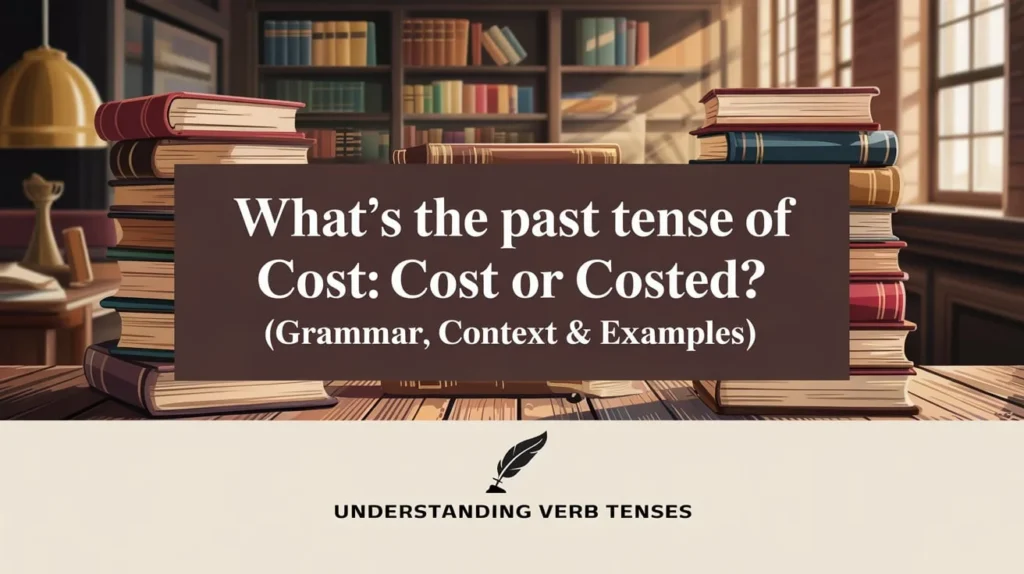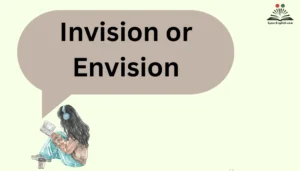Have you ever second-guessed yourself mid-sentence, wondering, “Wait… is it ‘cost’ or ‘costed’?” You’re not alone. This tiny verb causes big confusion—even among native English speakers. Some folks confidently say, “That jacket cost me $100,” while others argue, “It costed more last year.” So, who’s right?
The answer depends on how and where you’re using the verb. English, with its irregular verbs and context-based quirks, can get tricky. But don’t worry—this guide has you covered. Whether you’re learning English, polishing professional writing, or just a word nerd, this post breaks down the past tense of cost with clarity and real-life examples.
By the time you reach the end, you’ll know exactly when to say cost or costed, understand the grammar behind it, and even discover how professionals in fields like accounting and logistics use costed every day (yes, seriously!). You’ll get sample sentences, synonyms, expert tips, and even a printable grammar cheat sheet.
Let’s get into it.
Why Is There Confusion About “Cost” vs. “Costed”?
English verbs come in two main types when it comes to past tense: regular and irregular.
- Regular verbs add -ed to form the past tense (talk → talked).
- Irregular verbs do not follow that rule. They change in unique ways—or stay the same. (cut → cut, hit → hit, cost → cost).
Now, cost is mostly irregular, like put and shut. But here’s where it gets messy: in certain professional or technical contexts, people do use costed—and it’s considered correct.
So the confusion stems from:
- The irregular nature of cost in general use.
- The existence of costed in specific contexts (like accounting or budgeting).
- The common pattern of adding -ed to make a verb past tense, which leads people to default to costed.
What Does “Cost” Mean?
At its core, cost means the amount of money required to obtain something. But it can also refer to consequences, effort, or sacrifice.
Basic Definitions:
- As a verb: to require payment, loss, or effort
Example: This mistake cost us the contract. - As a noun: the price paid for something
Example: The cost of living is rising.
It can refer to:
- Financial value: “The book cost $15.”
- Emotional or physical toll: “The war cost them their peace.”
- Opportunity or consequence: “That decision cost her the promotion.”
The Past Tense of “Cost”: The Irregular Form
Here’s the short and simple rule:
In everyday English, the past tense of “cost” is “cost.”
No -ed. No costed. Just cost.
Examples:
- ✅ That dress cost $200 last year.
- ✅ His arrogance cost him the job.
- ✅ It cost more than I expected.
So why doesn’t it change? Because cost is an irregular verb—like cut, hit, let, and put. These verbs stay the same in the past tense.
Quick Table:
| Base Verb | Past Tense | Past Participle |
| cost | cost | cost |
| cut | cut | cut |
| put | put | put |
| hit | hit | hit |
When “Costed” Is Actually Correct
Now here’s the twist: costed is a real word—but only in specific contexts.
It’s not incorrect. It’s just not used in casual conversation.
So when do we use “costed”?
- When talking about the process of estimating or calculating costs.
- When using the verb in a deliberate action sense.
- In business, logistics, budgeting, or accounting contexts.
Let’s explore how that plays out.
“Costed” in Action: When It’s Used Intentionally
Referring to Cost Estimation or Forecasting
In industries where financial planning matters, the word costed often replaces cost when referring to estimates, analysis, or forecasting.
Examples:
- ✅ The project was carefully costed before approval.
- ✅ The materials were costed separately from labor.
This version of the verb focuses on deliberate analysis—not a simple price tag.
Emphasizing Deliberate Evaluation or Action
When someone actively evaluates the cost of something—especially as part of a process or job duty—costed is appropriate.
Examples:
- ✅ She costed out several options before presenting to the board.
- ✅ The agency has costed the social impact of the program.
You wouldn’t say “She cost several options”—that sounds incomplete.
Usage in Professional Jargon and Sector-Specific Writing
In corporate, government, and technical writing, costed is often standard.
Case study: In the UK’s public sector budgeting, phrases like “costed proposals” or “fully costed initiatives” are used frequently in official reports and policies.
Examples from reports:
- “The fully costed plan will be released next quarter.”
- “All infrastructure updates have been costed for fiscal year 2025.”
Verb Tense Breakdown for “Cost” and “Costed”
Let’s break down how cost and costed behave in different tenses and scenarios:
| Tense | Usage | Example |
| Present Simple | General truth or current event | This car costs too much. |
| Past Simple | Action completed in past | It cost more last year. |
| Present Perfect | Past action with present relevance | It has cost me dearly. |
| Past Perfect | Action before another past event | It had cost them a fortune. |
| Future | Prediction or future plan | It will cost a lot to fix. |
| Passive Voice | When the object receives the action | The event was costed carefully. |
| Progressive | Ongoing action | They are costing the materials now. |
Sentence Examples: Real Usage in Context
Examples with “Cost” (Irregular Form)
- That laptop cost me two weeks of wages.
- The error cost the company $1.2 million.
- It cost more than it should have.
- His decision cost him his best friend.
Examples with “Costed” (Formal Contexts)
- The consultants costed the expansion project.
- Each item was individually costed for inventory.
- The final report was based on thoroughly costed figures.
- The building renovation was costed at $500,000.
Synonyms and Related Terms
Sometimes, using a synonym can improve clarity—especially when costed feels awkward.
Synonyms for “Cost” (General Use)
- Price
- Fee
- Charge
- Rate
- Expense
Example:
The price of admission was too high.
Synonyms for “Costed” (Specialized Use)
- Estimated
- Evaluated
- Priced
- Assessed
- Budgeted
Example:
The department budgeted $50,000 for the initiative.
Etymology and Evolution of “Cost”
The word cost traces back to Latin:
- Latin: constare – “to stand firm, to be fixed”
- Old French: coste – “price, value”
- Middle English: costen – “to require payment”
Over time, cost became standard in both noun and verb forms in English. The idea of costed entered much later, as technical professions needed more precise terms for budget planning.
FAQs: Quick Answers for Common Confusion
Is “costed” ever wrong?
Yes—if you’re using it in casual speech to mean “paid for.” Stick with cost in everyday use.
Is “costed” only British English?
Not at all. It appears in both British and American professional writing.
Can I say, “It costed a lot” in a sentence?
Nope. That would be incorrect in informal or spoken English. Say “It cost a lot.”
How can I tell when to use “costed”?
Ask: Was there an evaluation process or budget involved? If yes, costed might be right.
Is there a simple trick to remember this?
Yes:
- “Cost” = what you paid
- “Costed” = what you calculated
Final Thoughts: Which One Should You Use?
Here’s a cheat sheet to lock it in:
| Situation | Use |
| Talking price in casual conversation | Cost |
| Telling a story or reflecting on loss | Cost |
| Describing a budgeting or forecasting process | Costed |
| Writing a professional report | Costed |
| Using action verbs in speech or writing | Cost |
Bottom line?
👉 Use “cost” for most situations. Use “costed” only when you’re clearly describing a calculated, professional evaluation.
Bonus: Printable Quick Reference
Here’s a handy summary chart you can print or save:
markdown
CopyEdit
**Past Tense of Cost Cheat Sheet**
✅ Use “cost” when:
– Talking about price or value
– Speaking casually
– Telling a story
✅ Use “costed” when:
– Referring to cost estimation
– Writing formally or professionally
– Discussing budgeting, analysis, or planning
Related Resources
- Merriam-Webster: Definition of Cost
- Cambridge Dictionary: Cost
- Grammarly: Irregular Verbs
- Oxford Learner’s Dictionaries




